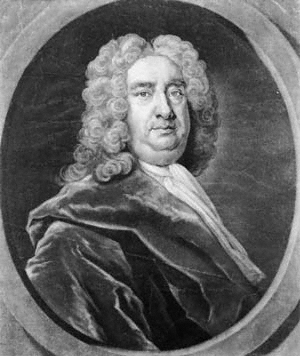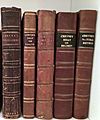George Cheyne (physician) facts for kids
Quick facts for kids
George Cheyne
|
|
|---|---|
 |
|
| Born | 1672 Methlick Aberdeenshire, Scotland
|
| Died | 1743 |
| Nationality | Scottish |
| Occupation | physician |
| Known for | vegetarianism |
George Cheyne (1672–1743) was a Scottish doctor, early expert in mental health, philosopher, and mathematician. He is especially known today for being one of the first people to promote vegetarianism for health reasons.
Contents
Life of George Cheyne
George Cheyne was born in 1672 in Methlick, a place near Aberdeen in Scotland. He passed away in Bath, England, on April 12, 1743.
Cheyne was a very curious person. He wrote many books about different subjects. These included medicine, science, religion, and math. His books were often very popular and were translated into several languages like Latin, French, and German. Famous writers like Samuel Johnson and Alexander Pope enjoyed his work.
He knew the famous scientist Sir Isaac Newton. Cheyne even encouraged Newton to publish some of his important works on math and light.
Cheyne believed that everything in the world has a cause. He thought it was impossible for animals or plants to have existed forever. He used the example of a "Clock-work" to explain that things depend on each other. For instance, without the sun, there would be no fruit.
He also wrote about common health issues of his time, such as fevers and nervous problems. He also wrote about staying healthy. In 1740, he wrote The Essay on Regimen. This book is still often mentioned by people who support vegetarianism and animal rights.
Cheyne himself experienced sadness and low spirits. He believed that smart and creative people were more likely to suffer from these feelings. He wrote that "Fools, weak or stupid Persons... are seldom troubled with Vapours or Lowness of Spirits."
Education and Early Career
George Cheyne studied medicine at the University of Edinburgh and the University of Aberdeen. After finishing his studies, he moved to London in 1701. There, he started his medical practice. In 1702, he became a member of the Royal Society, which is a famous group for scientists.
Cheyne wrote about his own life and experiences up to 1733 in his book The English Malady.
Cheyne's Family Life
George Cheyne married Margaret Middleton around 1712. They had three children who lived: Francis, Peggy (Margaret), and John. John later became a vicar, which is a type of priest, in Brigstock.
Medical Practice in Bath and London
For a while, Cheyne worked in Bath during the summer and in London during the winter. But in 1718, he decided to stay in Bath permanently.
Cheyne was known for his ideas about how the brain affects mental health. He is sometimes seen as one of the first people to study mental health from a scientific point of view.
Cheyne was a very large man, weighing almost 203 kg (32 stone) at one point. This made him the subject of jokes. A poem from the 1730s made fun of his weight and his advice to drink milk and eat vegetables. The poem suggested he should "Eat grass, reduce thyself, and die."
Cheyne, being a clever person, wrote a witty reply. He said his ideas were his own and that his mistakes only hurt himself. He also joked that if his critics tried his diet, they might "regain your mind."
The Importance of Exercise
Cheyne always told his patients that exercise was very important for their health. When the weather was bad, he suggested using a "tremoussoir" (a type of indoor exercise machine) or walking inside a house. When the weather was good, he recommended activities like walking, riding horses, fencing, dancing, billiards, tennis, football, and even digging.
He thought walking was the most natural exercise. Riding horses, he believed, was the most manly and healthy because it moved the "whole Machine" (the body). He also said that exercise should be regular and not too hard. It should not be done on a full stomach and should only make you warm, not sweaty.
Cheyne also stressed that exercise was important for women, even those who were pregnant. He believed that fresh air and gentle exercise were as necessary as food and rest to stay healthy and prevent problems.
How to Stay Healthy in Old Age
Cheyne had advice for people who wanted to live a long and healthy life, which he called a "Green Old Age." He suggested that after the age of fifty, people should start eating and drinking less, especially in terms of quantity.
He believed that around this age, the body's systems start to slow down. By reducing food and drink, he thought people could keep their blood and other body fluids flowing better. This would help them avoid blockages and stay healthier as they got older.
Cheyne and Vegetarianism
To connect with his patients, Cheyne used to visit local taverns, which was common for doctors back then. He became very popular in social circles. However, eating and drinking a lot of rich food made him very overweight and unhealthy.
He decided to try a diet without meat, eating only milk and vegetables. This helped him get healthy again. But when he went back to eating some meat, even in smaller amounts, he gained weight and his health got worse.
So, he returned to his vegetarian diet for the rest of his life. He strongly recommended this diet for anyone who was overweight or had other health problems.
Cheyne was one of the first people to promote a milk and vegetable diet. He wrote about it in his book An Essay of Health and Long Life, first published in 1724. Even though other doctors at the time didn't agree with his diet, his book was a huge success. It had four new printings in its first year alone!
Main Works
George Cheyne wrote many important books. They covered medicine, philosophy, and mathematics. He also wrote about religious ideas that combined new ways of thinking from the Enlightenment with older spiritual beliefs. His books were often printed many times and translated into other languages. Here are some of his main works:
- Philosophical Principles of Religion: Natural and Revealed, 1705 (Part I) and 1715 (Part II). These books discussed ideas about natural science and religion.
- Observations concerning the Nature and due Method of treating the Gout, 1720. This book focused on how to treat gout, a painful joint condition. It also talked about the healing qualities of the waters in Bath.
- The Essay of Health and Long Life, 1724. In this book, Cheyne shared his own experiences and observations on health. He wrote that it's easier to stay healthy than to get well after becoming sick.
- The English Malady, 1733. This work was about different kinds of nervous diseases, including what people called "Spleen" or "Lowness of Spirits."
- The Essay on Regimen, 1740. This book was meant for people suffering from gout, lung problems, or nervous conditions. It discussed both physical and spiritual health.
- The Natural Method of Cureing [sic] the Diseases of the Body, and the Disorders of the Mind depending on the Body, 1742. This was his last book and became very popular. It focused on how to cure physical diseases and mental problems related to the body.
Images for kids
 | Jackie Robinson |
 | Jack Johnson |
 | Althea Gibson |
 | Arthur Ashe |
 | Muhammad Ali |







